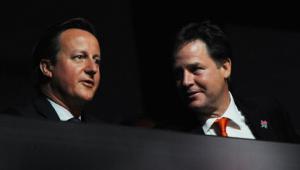12 May 2000
Four years ago, the Conservatives were reeling from yet another battering at the local polls as Labour grabbed a clutch of their former strongholds. Last week it was Labour's turn to feel the pinch, losing more than 550 seats and 16 town halls in what has been described as its worst local election performance since the party came to power.
The results have been a body blow for the Labour government and, with the added fiasco of its disastrous campaign in London, the Blair team is left wondering where it all went wrong.
For Labour, local government provided an opportunity to buck the electoral trend and prove that where the Conservatives had failed to retain grassroots support, they could succeed. Local authorities have been a key area of reform, with pledges to improve council services and revitalise local democracy.
But these reforms appear to have fallen on the ears of an uninterested and de-motivated electorate, with turnouts in some areas again dipping below 30%. Labour sources have openly admitted that the losses were much worse than anticipated while the Conservatives, with a gain of 600 seats, put up their best performance in almost 20 years. Home Office estimates have put the turnout across England at roughly 30%, compared with 38% for a mid-term Conservative government in 1995.
Tackling voter apathy is a priority for Labour and in the long term threatens its huge Commons majority.
The UK now records some of the lowest election turnouts in the European Union, despite experiments this month to offer the electorate more flexible voting. According to early Home Office figures, just 2% of the electorate opted to vote early in 15 pilot schemes. At Watford, the turnout slumped from 36% to 27%, despite the polling booths opening over the weekend. Labour has since lost its majority on the council.
But it wasn't all depressing news for the government, Gateshead Metropolitan Borough Council managed to more than double turnouts in two wards by using postal voting. The turnout in one ward, Whickham North, was 62.2%. But, for a government anxious for progress, it still represents only marginal success.
Even Gerry Stoker, chair of the Blairite New Local Government Network and a proponent of flexible voting, concedes that these experiments will only make voting easier and will not motivate the electorate.
But why are voters disaffected? For councillors of all political persuasions, part of the problem lies with the government's centralist policy, particularly its newly notorious policy of direct funding, or Frontline First.
Schools were the first target, with extra cash in the Budget going straight into the head teachers' coffers. Housing has already suffered from the central treatment, with councils projected to lose most of their housing stock to registered social landlords by 2004. Social services may be next in line.
'This government is simply continuing 19 years of Conservative rule, stripping powers from local authorities and undermining local democratic legitimacy,' said Howard Sykes, the deputy leader of Oldham Council, which transferred to Liberal Democrat control last week after 20 years of Labour rule. 'Their centralist tendencies are definitely having an impact. People will only vote if they think it is important and local authorities are becoming less and less important.'
Sykes, the chief executive of the Association of Liberal Democrat Councillors, predicts that councils will have no control over schools by the next General Election.
Sir Jeremy Beecham, chair of the Local Government Association, and until recently a staunchly loyal Labour supporter, also warns that Frontline First will diminish interest in council elections. 'The government needs to relax and make it clear that local issues matter,' he said.
But Labour's losses, notably former heartlands such as Rossendale, Bradford, Hartlepool, Burnley and Wirral, are ultimately another party's gain. The Conservatives are already carving out a new niche in opposition to policies such as Frontline First. They have proposed the abolition of the regional development agencies, with all powers transferring to local authorities.
John Redwood, former shadow spokesman for the environment, transport and the regions, said: 'There will be a general theme of power to the people. We understand that if people vote for local representatives they don't expect them to go cap in hand to quangos.'
But for Chris Mead, elections editor at the Press Association news agency, the government may simply have to grin and bear its poor election results and low turnouts. 'It may be a trend against the government in power,' he said. 'If this trend continues into Labour's second term, it will be in the same position as John Major's government, with a pitifully small local council base.'
Local politics will have turned full circle.
PFmay2000


















